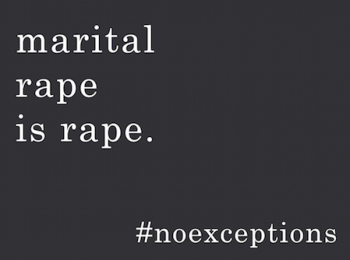 Gender equality group AWARE applauds the long awaited repeal of marital immunity for rape and the decriminalisation of suicide in its submission to the public consultation on the Penal Code review. To increase reporting of sexual crimes, the group recommends comprehensive education for the public, professionals and all officials in the criminal justice system, and a clear definition of consent in the Penal Code.
Gender equality group AWARE applauds the long awaited repeal of marital immunity for rape and the decriminalisation of suicide in its submission to the public consultation on the Penal Code review. To increase reporting of sexual crimes, the group recommends comprehensive education for the public, professionals and all officials in the criminal justice system, and a clear definition of consent in the Penal Code.
“After more than a decade of steadfast advocacy for the full, unqualified repeal of marital immunity for rape, AWARE is delighted to finally welcome this monumental change. This sends a powerful signal that our government does not condone violence against women under any circumstances, including in marriage,” said Corinna Lim, Executive Director of AWARE.
“But a repeal on its own will not be enough to dismantle the barriers that prevent women from reporting sexual assault. It is crucial that we also see state-led, widespread public education on consent and gender roles, especially in pre-marriage workshops, in order to chip away at the harmful gendered expectations around spousal sexual relations.”
AWARE’s recommendations on section 309 on the decriminalisation of suicide are made together with Silver Ribbon in a joint submission to the public consultation, which can be read in full here.
Prioritise gender-sensitisation training for professionals and all in criminal justice system
Despite the steps taken to address gaps in the law that pertain to offences against vulnerable persons, AWARE is concerned about the general over-reliance on harsh penalties such as more caning and longer sentences to deter crime.
Said Anisha Joseph, Head of Sexual Assault Care Centre (SACC) at AWARE, “Eight in 10 survivors of sexual violence that we see at SACC know or are close to their perpetrators. Most times, the prospect of harsher punishment against their abusers can heighten their fears of destroying the perpetrator’s life and also of retaliation, hence deterring survivors from reporting.”
Instead, AWARE recommends that the Government work closely with partners to roll out an effective and comprehensive communications and education programme as part of the changes to the Penal Code to increase reporting of sexual offences.
AWARE also recommends that relevant Ministries conduct trauma-informed gender-sensitisation training for professionals on the ground who come across survivors of marital rape and other forms of sexual violence in their work, including social workers, doctors and police officers.
Said Ms. Joseph, “Some clients we see have received discouraging and victim-blaming comments from professionals when they disclosed their experience of sexual violence – for example, survivors of marital rape have, upon reporting their assault, been told that sex is simply expected in a marriage. Or there is an unreasonable level of suspicion that they are vindictive wives falsely accusing their husbands. We need to dispel the prevailing myth that marriage grants automatic access to a spouse’s body. ”
Other major recommendations from the group are stated below:
Section 12 – Voyeurism and non-consensual distribution of intimate images
- AWARE welcomes the recommendations to criminalise non-consensual voyeurism, and recommends that mechanisms be set up for the swift removal of the materials from the accused’s control, from other persons that the accused has passed the images to, and from general circulation, even before conviction.
Section 23:6 – Consent
- AWARE cites its experience working with sexual assault survivors to support its call for a clear, statutory definition of “consent”. “The Penal Code defines consent in a convoluted manner, relying on many different sections under the Code. Professionals on the ground like social workers, counsellors, and laypersons, including survivors, find it difficult to understand the term,” said Ms Lim.
- AWARE said it has seen several cases where investigation bodies and/or the authorities seemed to believe that a survivor who did not use physical force to resist the perpetrator must have consented to sexual assault, even though the Courts have already ruled that physical submission does not in itself amount to consent.
- Based on already existing case law and research on how consent is conceptualised in other common law countries, AWARE recommends that consent for sexual activity be defined as the “free, informed and voluntary participation of the complainant in the sexual activity in question” and that “lack of resistance and submission to sexual activity, in itself, is not consent as a matter of law.”
Section 26: Updating sexual offences
- AWARE recommends updating and amending the language of “outrage/insult of modesty”. ““Modesty” is an outdated concept and in the sexual context, associated with regressive notions of women’s chastity and should be done away with,” said Ms. Lim. Instead, the group said, “outrage of modesty” should be renamed “sexual assault” to reflect the prevailing understanding of non-consensual sexual conduct as a violation of an individual’s right to control what is done to their body, instead of as an “outrage” of an abstract quality called “modesty”. “Insult of modesty” should be renamed to “sexual harassment” to supplement the provisions under the Protection from Harassment Act, which does not specifically include an offence of sexual harassment.
377A
- AWARE strongly calls for section 377A of the Penal Code to be repealed. To be a truly inclusive and humane society that values all its people equally, Singapore must repeal the law that discriminates against a group of persons based on their sexual orientation.
- “Although it is unenforced, 377A is used to embed norms and values that are discriminatory against groups of persons, and we have come across this on a regular basis. Many people have reached out to us to seek help on how to deal with discrimination they face at the workplace or schools because of their sexual orientation and gender identity, and there is a general lack of public education on sexuality,” said Ms. Lim. “The repeal of section 377A in ex-British colonies such as India and Trinidad and Tobago has created momentum toward a more inclusive and equal international community. We urge the government to seize the opportunity presented by the Penal Code review to repeal 377A and offer protection and equal treatment to all its citizens”.
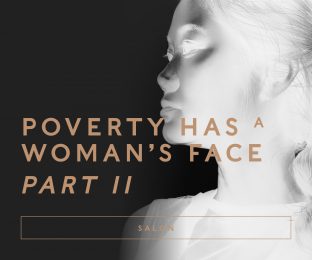 Following AWARE’s enlightening panel discussion on poverty and inequality in August, 1880 continues the important conversation on inequality in Singapore. Why do some women from low-income households choose to remain unemployed? What sort of challenges do they face striving for economic security while balancing responsibilities at home? The discussion will explore how members of society and the state can improve and fix the situation.
Following AWARE’s enlightening panel discussion on poverty and inequality in August, 1880 continues the important conversation on inequality in Singapore. Why do some women from low-income households choose to remain unemployed? What sort of challenges do they face striving for economic security while balancing responsibilities at home? The discussion will explore how members of society and the state can improve and fix the situation.



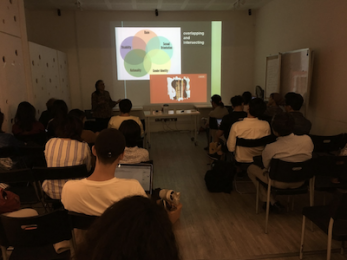 On 25 September, Associate Professor Maznah Mohamad held a talk at AWARE on intersectionality of the women’s movement in Malaya. The term ‘intersectional’ was coined by Kimberlé Crenshaw (1989) which views that “
On 25 September, Associate Professor Maznah Mohamad held a talk at AWARE on intersectionality of the women’s movement in Malaya. The term ‘intersectional’ was coined by Kimberlé Crenshaw (1989) which views that “ Gender equality group AWARE applauds the long awaited repeal of marital immunity for rape and the decriminalisation of suicide in its
Gender equality group AWARE applauds the long awaited repeal of marital immunity for rape and the decriminalisation of suicide in its 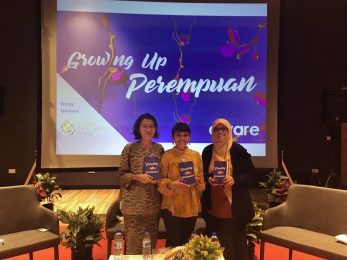 These are a few lines from a book that has sent so many readers in tears. Growing up perempuan (as a woman) is not easy. Growing up as a Muslim woman is even harder. As Singaporean-Muslim women, most of us deal with being a woman as well as being minorities in a country where the Muslim community and its issues are brought up and represented by our male counterparts. Representational politics render so many people voiceless. The Muslim woman is often spoken over and spoken for. The image of Muslims are often monolithic in the first place. We do not understand sufficiently the diversity in our own community. And rarely are we given the chance and platform to authentically express ourselves with the safety and assurance that we will be heard and that our concerns will not be ridiculed or trivialised.
These are a few lines from a book that has sent so many readers in tears. Growing up perempuan (as a woman) is not easy. Growing up as a Muslim woman is even harder. As Singaporean-Muslim women, most of us deal with being a woman as well as being minorities in a country where the Muslim community and its issues are brought up and represented by our male counterparts. Representational politics render so many people voiceless. The Muslim woman is often spoken over and spoken for. The image of Muslims are often monolithic in the first place. We do not understand sufficiently the diversity in our own community. And rarely are we given the chance and platform to authentically express ourselves with the safety and assurance that we will be heard and that our concerns will not be ridiculed or trivialised.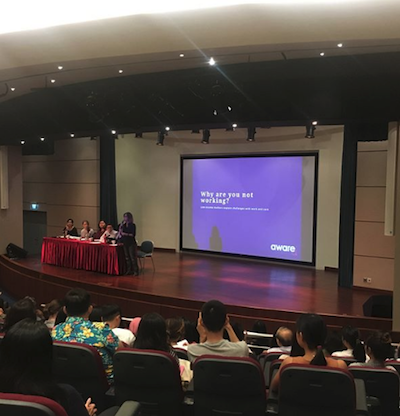 On 11 August, more than 300 people showed up at the Singapore Post Auditorium for the
On 11 August, more than 300 people showed up at the Singapore Post Auditorium for the